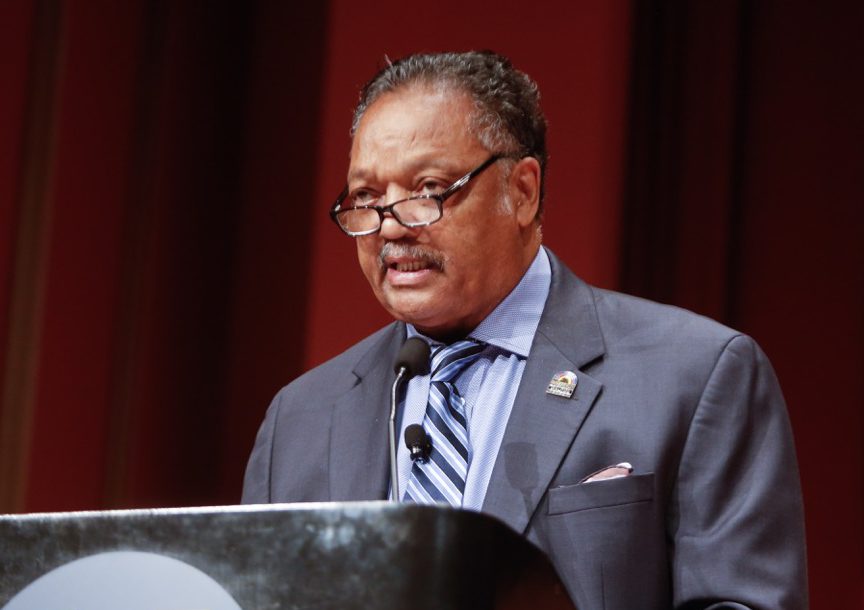
When the Rev. Jesse Jackson visited the University of Michigan campus in Ann Arbor on Wednesday to be honored for his 50 years of civil rights activism, the toll that those years have taken on a truly remarkable life were evident, especially to anyone who has witnessed the marvel of Jackson in his prime. His gait was slower and at times a bit unsteady, and his voice was much softer, and at times a bit unclear.
But there was absolutely nothing wrong with his mind.
Jackson’s unique ability to analyze a complicated racial/socio-economic/cultural situation, then translate that situation into easily understandable form, is a rare gift that has elevated him as a man apart. Controversial and infuriating are certainly two of the more frequently heard words used to describe him, but the words brilliant, fearless and committed must also be added to any accurate description seeking to depict someone as complex and gifted as Jackson.
In that context, Jackson’s remarks, which focused on what comes next following the election of Donald Trump, were well worth paying attention to in the midst of so much consternation, punditry, and flailing prognostication seeking to identify what went wrong as well as what course corrections must be implemented to get the Democratic train back on track.
Although the more popular narrative of the day seems to be that Democrats forgot about the disgruntled white working class, a number of whom voted for President Obama in 2008 and 2012 but then supported Trump in 2016, Jackson’s take on the disappointing results was noticeably different. It is also a perspective with which I happen to wholeheartedly agree; Hillary Clinton did not lose primarily because of the desertion of the angry white working class, or even because not enough black folks turned out to vote, although both are certainly factors. But one major factor that nobody seems to be addressing is the effect that voter suppression had on decimating the black vote.
“They suppressed the black vote in North Carolina, Florida, Pennsylvania and Michigan,” said Jackson. “We cannot give up on letting them steal our votes so easily. …These are times for resistance.”
In an interview prior to his speech, Jackson referred a reporter to a November 8 editorial in the New York Times which spelled this effect out quite clearly. Please excuse the unusually long pull quote(s), but Jackson referenced the importance of this particular editorial for a reason, and that reason will be made clear when you take a look:
“On Tuesday, for the first time in more than 50 years, Americans went to the polls to elect a president without a fully functioning Voting Rights Act — thanks to an insidious decision by the Supreme Court in 2013.
“Consider what has been happening in North Carolina, a battleground state with a history of racial discrimination in voting. Republican lawmakers and officials have gone to remarkable lengths to drive down turnout among black voters, who disproportionately favor Democrats. Among other things, they cut early voting hours and Sunday voting, and closed polling places in minority communities, despite significant public opposition.
“In other places with similar histories of discrimination, officials have closed polling places, creating longer lines and making it difficult, if not impossible, for people in minority communities to vote. In Texas, the number of voting locations has been reduced by more than 400. In Arizona, nearly every county closed at least one voting location; about 60 percent of counties in Louisiana and numerous counties in Alabama did so as well. A vast majority of these closings would have been blocked had the Voting Rights Act not been eviscerated by the Roberts Court.
“Meanwhile, a new study by the Leadership Conference Education Fund, a civil rights group, looked at almost half of the counties that had been under federal supervision before 2013 and found that 43 percent have closed polling places since the Shelby County decision. Fourteen states put in place new voting restrictions for the 2016 election, including some states that were never under federal supervision, like Indiana, Ohio and Wisconsin.”
In other words, if you turn back the clock and subtract the effects of black voter suppression from the equation, Hillary Clinton would now be our new president. With or without the angry white males.
The browning of America is real, and it scares the daylights out of many of the not-so-brown.
Secondly, the popular vote matters. There is a rising chorus of discontent pointing out that the Electoral College is sorely outdated and no longer needed. As Jackson emphasized strongly during his remarks, it’s time for one-person-one-vote, the true foundation of democracy, to become a reality.
“First of all, she [Hillary Clinton] won. One person, one vote. Democracy,” he said. “She won the popular vote. If it were not for voter suppression she would have won the vote in the Electoral College as well.”
“Secondly, they suppressed the black vote in North Carolina. Black vote was down 8.5 percent [below 2012 levels]. White vote was up 22 percent.”
Jackson added that new voting laws since 2013 wiped out 868 polling places. That includes removing polling places from campuses “and other familiar places” he said.
“At the base of our nation there is an identity crisis; do we want to be an aristocracy or a democracy? Multiculturalism or race supremacy? An aristocracy for the few, or democracy for the many? Will we be a one-person one-vote democracy or ruled by electoral overseers?”
When asked what should be the strategy for Democrats moving forward, the answer for him was relatively simple:
“Protect the black vote.”
As for young people, many of whom have been actively voicing their discontent daily on campuses and in the streets across the nation, “Struggle is a long distance struggle. They’ll be struggling the rest of their lives,” he said.
But the painful truth?
“Many of those marching this week didn’t vote last week. That matters.”
What do we do now? Protect the black vote.


